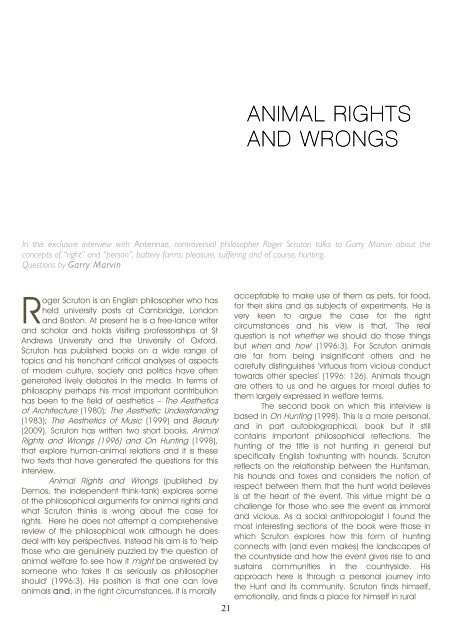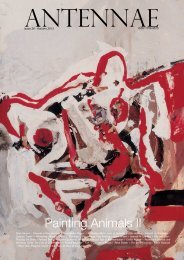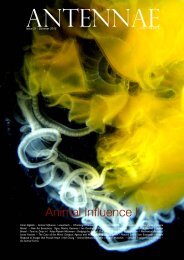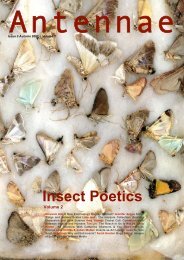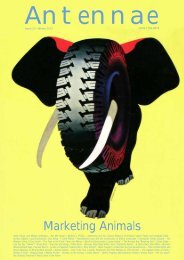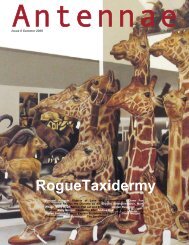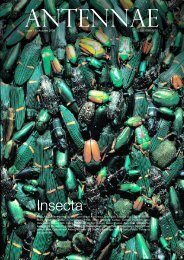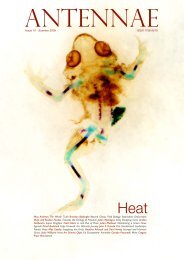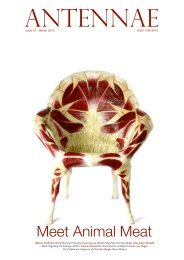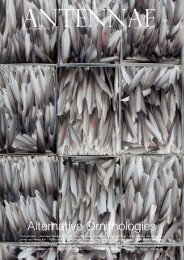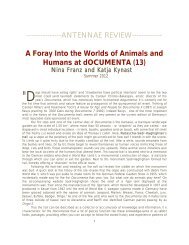Animal Wrongs and Rights - Antennae The Journal of Nature in ...
Animal Wrongs and Rights - Antennae The Journal of Nature in ...
Animal Wrongs and Rights - Antennae The Journal of Nature in ...
Create successful ePaper yourself
Turn your PDF publications into a flip-book with our unique Google optimized e-Paper software.
R<br />
oger Scruton is an English philosopher who has<br />
held university posts at Cambridge, London<br />
<strong>and</strong> Boston. At present he is a free-lance writer<br />
<strong>and</strong> scholar <strong>and</strong> holds visit<strong>in</strong>g pr<strong>of</strong>essorships at St<br />
Andrews University <strong>and</strong> the University <strong>of</strong> Oxford.<br />
Scruton has published books on a wide range <strong>of</strong><br />
topics <strong>and</strong> his trenchant critical analyses <strong>of</strong> aspects<br />
<strong>of</strong> modern culture, society <strong>and</strong> politics have <strong>of</strong>ten<br />
generated lively debates <strong>in</strong> the media. In terms <strong>of</strong><br />
philosophy perhaps his most important contribution<br />
has been to the field <strong>of</strong> aesthetics – <strong>The</strong> Aesthetics<br />
<strong>of</strong> Architecture (1980); <strong>The</strong> Aesthetic Underst<strong>and</strong><strong>in</strong>g<br />
(1983); <strong>The</strong> Aesthetics <strong>of</strong> Music (1999) <strong>and</strong> Beauty<br />
(2009). Scruton has written two short books, <strong>Animal</strong><br />
<strong>Rights</strong> <strong>and</strong> <strong>Wrongs</strong> (1996) <strong>and</strong> On Hunt<strong>in</strong>g (1998),<br />
that explore human-animal relations <strong>and</strong> it is these<br />
two texts that have generated the questions for this<br />
<strong>in</strong>terview.<br />
<strong>Animal</strong> <strong>Rights</strong> <strong>and</strong> <strong>Wrongs</strong> (published by<br />
Demos, the <strong>in</strong>dependent th<strong>in</strong>k-tank) explores some<br />
<strong>of</strong> the philosophical arguments for animal rights <strong>and</strong><br />
what Scruton th<strong>in</strong>ks is wrong about the case for<br />
rights. Here he does not attempt a comprehensive<br />
review <strong>of</strong> the philosophical work although he does<br />
deal with key perspectives. Instead his aim is to ‘help<br />
those who are genu<strong>in</strong>ely puzzled by the question <strong>of</strong><br />
animal welfare to see how it might be answered by<br />
someone who takes it as seriously as philosopher<br />
should’ (1996:3). His position is that one can love<br />
animals <strong>and</strong>, <strong>in</strong> the right circumstances, it is morally<br />
21<br />
ANIMAL RIGHTS<br />
AND WRONGS<br />
In this exclusive <strong>in</strong>terview with <strong>Antennae</strong>, controversial philosopher Roger Scruton talks to Garry Marv<strong>in</strong> about the<br />
concepts <strong>of</strong> “right” <strong>and</strong> “person”, battery farms, pleasure, suffer<strong>in</strong>g <strong>and</strong> <strong>of</strong> course, hunt<strong>in</strong>g.<br />
Questions by Garry Marv<strong>in</strong><br />
acceptable to make use <strong>of</strong> them as pets, for food,<br />
for their sk<strong>in</strong>s <strong>and</strong> as subjects <strong>of</strong> experiments. He is<br />
very keen to argue the case for the right<br />
circumstances <strong>and</strong> his view is that, ‘<strong>The</strong> real<br />
question is not whether we should do those th<strong>in</strong>gs<br />
but when <strong>and</strong> how’ (1996:3). For Scruton animals<br />
are far from be<strong>in</strong>g <strong>in</strong>significant others <strong>and</strong> he<br />
carefully dist<strong>in</strong>guishes ‘virtuous from vicious conduct<br />
towards other species’ (1996: 126). <strong>Animal</strong>s though<br />
are others to us <strong>and</strong> he argues for moral duties to<br />
them largely expressed <strong>in</strong> welfare terms.<br />
<strong>The</strong> second book on which this <strong>in</strong>terview is<br />
based <strong>in</strong> On Hunt<strong>in</strong>g (1998). This is a more personal,<br />
<strong>and</strong> <strong>in</strong> part autobiographical, book but it still<br />
conta<strong>in</strong>s important philosophical reflections. <strong>The</strong><br />
hunt<strong>in</strong>g <strong>of</strong> the title is not hunt<strong>in</strong>g <strong>in</strong> general but<br />
specifically English foxhunt<strong>in</strong>g with hounds. Scruton<br />
reflects on the relationship between the Huntsman,<br />
his hounds <strong>and</strong> foxes <strong>and</strong> considers the notion <strong>of</strong><br />
respect between them that the hunt world believes<br />
is at the heart <strong>of</strong> the event. This virtue might be a<br />
challenge for those who see the event as immoral<br />
<strong>and</strong> vicious. As a social anthropologist I found the<br />
most <strong>in</strong>terest<strong>in</strong>g sections <strong>of</strong> the book were those <strong>in</strong><br />
which Scruton explores how this form <strong>of</strong> hunt<strong>in</strong>g<br />
connects with (<strong>and</strong> even makes) the l<strong>and</strong>scapes <strong>of</strong><br />
the countryside <strong>and</strong> how the event gives rise to <strong>and</strong><br />
susta<strong>in</strong>s communities <strong>in</strong> the countryside. His<br />
approach here is through a personal journey <strong>in</strong>to<br />
the Hunt <strong>and</strong> its community. Scruton f<strong>in</strong>ds himself,<br />
emotionally, <strong>and</strong> f<strong>in</strong>ds a place for himself <strong>in</strong> rural


